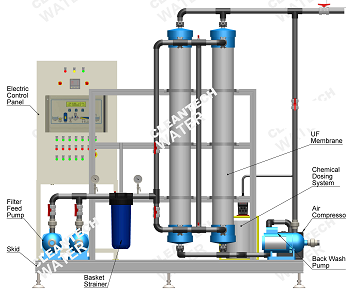 Cleantech is a well-known name for a wide spectrum of Ultrafiltration water treatment systems. We believe in high-quality and reliable systems that bring high Return on Investment to the clients. When you rely on us for good-quality systems, it is guaranteed that the output is the best in the class.
Cleantech is a well-known name for a wide spectrum of Ultrafiltration water treatment systems. We believe in high-quality and reliable systems that bring high Return on Investment to the clients. When you rely on us for good-quality systems, it is guaranteed that the output is the best in the class.
Ultrafiltration is an important process that can separate micro organic molecules and colloids from water with maximum efficiency and effectiveness. The process is used as the pre- treatment to Ion exchange and RO exchange. We have supplied ultrafiltration water systems to a large number of clients who vouch for the superiority of the product. With relatively less pressure requirement than RO system, it is preferred by several applications nowadays.
Each of our Ultrafiltration Plant Systems offers superior output because of stringent design, smoothness of operations, and excellent customer service. We ensure that the filtration plant provided by us gives optimum output and high effectiveness.
What are the Distinguishing Features of Ultrafiltration Water Treatment?
Ultrafiltration systems offered by Cleantech are admired by customers for certain special features:
- Modular design for quick installation
- Highly energy efficient system
- The best separation output amongst competitive products
- Excellent quality output
- Long-lasting membrane and low fouling
- Low maintenance requirement
- Provides advanced monitoring and controlling system
- Top-class standardized equipment
Widespread Use of Ultrafiltration
Versatile, multipurpose systems by Cleantech are used in several industrial and other sectors.
- Metal industry
- Pre and post treatment to Ion exchange and RO systems
- Reuse of wastewater
- Recovery of contaminants
What is Ultrafiltration?
Ultrafiltration is a separation technique than uses membranes of pore size of .01 to .001 microns. The method is used for removing impurities of high molecular weight. It can remove organic and inorganic polymeric molecules ad colloidal material. However, it is ineffective in removing low molecular weight ions or molecules, e.g. Calcium, sulfate, Sodium and Magnesium Chloride. In this filtration method, the osmotic pressure difference is negligible across the surface if the membrane because the filtration is done for high molecular weight particles. Hence, you don’t need to apply high pressures to achieve high flux rates.
Flux rate is nothing but the amount of permeate products that pass through the per unit area of membrane in a unit time. It is referred in GFD. When we supply tested and inspected ultrafiltration plant to you, it is tested under stringent quality parameters and tough testing conditions. Therefore, you never get an inferior quality product that fails to meet your expectations. Rather, we serve beyond your satisfaction levels. Each of the team members is committed resolving customer queries and problems.
Ultrafilter and Conventional Filter: The Comparison
Typically, Ultrafiltration process is similar to Reverse Osmosis. The only thing is, here liquid stream flows along the membrane surface tangentially. Thus two streams are created. The stream that is in the contact of the membrane is known as permeate. Several characteristics affect the rate of permeation such as quality of feed, characteristics of the membrane and the operating conditions. The other stream of liquid is called concentrate stream. It gets concentrated further. In this case, the membrane doesn’t collect ions, but it acts as the barrier to molecules, collides and ions.
In the conventional filter (cartridge filter or media filter), suspended solids are removed by trapping them into the filter media. Since the filters act as depository of solids, they are required to clean regularly to maintain high levels of efficiency. After wear and tear, they need to be replaced.
Typically, conventional filters are used to remove large particles (physical impurities) before they are passed to membrane filters. It increases the efficiency of the membrane filter as it is required to remove finer particles and dissolved substances only.
In ultrafiltration pre-filtration process by putting conventional filter is not used. The membrane filter has to perform the task of filtering all emulsified as well as suspended particles.
What Can Affect the Performance of Ultrafiltration Water System?
- Permeate rate is directly proportional to the velocity of the flow across the surface of the membrane. This parameter is further critical in case of high viscosity liquids such as suspensions and emulsions. As the flow increases, more pumping energy is required. Hence, it is important that the velocity shouldn’t go beyond the optimum limits as it results in loss of efficiency. It can be achieved by calculating the right ratio between the pump energy and permeate rate.
- Pressure across the membrane surface also affects the permeate rate. In ultrafiltration membrane modules using capillary technology, the operating pressure has to be kept low because of structural limitation. Very high pressure causes compaction and fouling.
- Temperature also plays an important role in deciding the performance of ultrafiltration system. Usually, permeate rate increases with the increase in the temperature. However, the correlation has to be studied before reaching to a conclusion.

